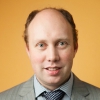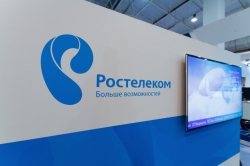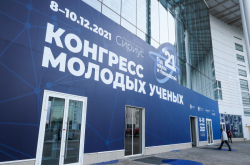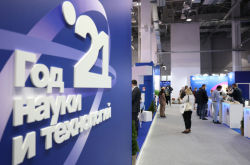Each year, the Sirius educational center in Sochi welcomes up to 600 talented children from all over Russia. Throughout the year, school students aged from ten years and above arrive there for project sessions that last for 24 days. During this time, they get advanced knowledge in their chosen fields, as well as meet famous experts, attend workshops and go on field trips. Education at Sirius focuses on four subject areas: Science, Literature, Arts, and Sports, with several courses for each. Children can participate in programs at Sirius for free, though they have to pass competitive selection.
Press service internships
Three Master's students from the Science Communication educational program had their summer internships at Sirius. For the most of July, Anasasia Svarovskaya, Yana Dolzhanskaya and Tamara Besedina covered the activities that were part of the Big Challenges program. 400 talented highschoolers came to Sochi for this session, to present their projects in 12 research fields: agricultural, bio- and nanotechnologies, unmanned transport and logistic systems, bionic robots and neural interfaces, Big Data, cognitive research, microcosm and microscopy, new materials, ocean engineering, personalized medicine, modern power industry, satellites and manned spacecraft. All of the session's participants were already winners and runner-ups of the All-Russian Contest for Project and Research Works, who already had accomplishments in the field of Natural Sciences, Physics and Mathematics.

"I've wanted to go to Sirius for a while now to see what it is about. I read different opinions about the center, including negative ones. Yet, having worked here myself, I understand that children find great opportunities there. The participants note that in their home cities, they would have never had the chance to work with such advanced equipment as they had in Sochi. Also, the programs at Sirius are practice-oriented, which helps children understand whether they really like what they are doing. What's more, as many novice scientists from different fields gather there, they have a chance to learn about many fields of science," shares Yana Dolzhanskaya.
At Sirius, Yana and the other Master's students from ITMO University spent much time communicating with the session's participants so as to write about their projects on the center's website and on social media. The novice science communicators accompanied the children during their field trips, watched them conduct experiments, and took interviews with their scientific advisors.
"I was really impressed by the children's enthusiasm. What's most important is that they clearly understand why and what for they are studying here at Sirius. Consciousness, dedication, motivation - these are the traits that characterize them most. And that's great, isn't it?" adds Anastasia Svarovskaya.

Summer session's participants. Credit: https://vk.com/siriusdeti
The participants' projects were on recycling spoiled fruit and vegetables into fuel, creating shampoo with nanoparticles, developing medical devices for evaluating concentration of compounds and many other topics.
According to Yana Dolzhanskaya, ITMO's Master's students succeeded in strengthening the basics and the principles of science communication at Sirius. They've worked with novice researchers from many fields of science, as well as explained to the future scientists what science communication is and why it's important to inform the public about new inventions and technologies.
"Most children have never heard about science communication before, but were very open and took pleasure in explaining their projects. Soon after, they and their scientific advisors started to invite us to their experiments so that we would write about them. Sometimes, we had to communicate with representatives of various fields of science during the same day, so I've learned to quickly switch between topics and improved my skills in communicating with different people," adds Anastasia Svarovskaya.
Master's student Tamara Besedina even went as far as to conduct a workshop on a structure of a scientific press-release. Together with the children, they created detailed outlines for articles on three of the projects.

Participant of the summer session. Credit: https://vk.com/siriusdeti
"I really liked the childrens' attitude, that they put much effort in their projects, and really care about their research. The children spoke a lot about what's important in their research and the problems they solve. For instance, I never knew before that seaweed and oil are equally dangerous for ships and sea creatures, and that it is most difficult to monitor oil spills or prosecute ship owners who don't wash their ships in port. There were also projects that had to do with shipbuilding and imports phase-out for fish-feed. The children try to solve such problems, and let's hope they will," comments the Master's student.
Nanograd summer school
Maksim Ivanov, staff member of the Project Management and Innovation Department acted as a lecturer and expert for a series of workshops at the Nanograd summer school. The school took place at Sirius as part of the Nanograd All-Russian Children and Youth Forum. The summer school included events aimed at promoting teacher and student participation in educational programs in the field of natural sciences and high technologies.
Maksim worked with teams of school students that develop educational projects like "Ready-made lesson", "Interactive textbook" and such. He also conducted lessons and workshops that had to do with using interactive technologies in education. Maksim is quite accustomed to these fields, as he develops educational games for companies and educational establishments, and has recently launched a course on games in education for young teachers. His tasks at ITMO include working with talented children, as well, so Maksim came to Sirius to see how education is organized in Russia's most innovative summer camp.

Maksim Ivanov
"I tell talented children about the opportunities offered by ITMO University, discuss innovations in the field of education, and ask them about the approaches they believe to be most effective. They give me great feedback, so I learn a lot from them. My subject is very relevant for school students, yet many of them already learned that introducing innovations in education can be a difficult task," notes Maksim.
During the workshops, Maksim organized a business game, where children presented the School of the Present, the school they would've liked to study at now - a project based on real educational technologies. The children also spent their evenings playing intellectual games which combined education and entertainment. For instance, they've constructed a catapult and competed in marshmallow challenges, where they had to be build the highest tower made of spaghetti and marshmallow. This way, the children both had fun and developed engineering skills.
Training for programming contests

Summer session's participants. Credit: https://vk.com/siriusdeti
In June, Sirius also hosted the Sports Programming educational session under the guidance of Andrei Stankevich, Associate Professor at ITMO's Computer Technology Department and world-renowned trainer of programming champions - this year, his team became the champions of ACM ICPC for the 7th time.
The session was attended by talented children who used this opportunity to train for national and international programming contests. The summer school's program included lectures and practical sessions on solving programming tasks, as well as various workshops.
"This was the first Sports Programming session at Sirius. Among the participants were 7th to 10th year school students, winners or runner-ups of the final stage of the All-Russian Programming Olympiad. All of them were really apt, to the point that we sometimes found it hard to choose tasks that will be appropriate for them. To break the monotony, we've decided to not just have classical lessons, but to also add something more fun to them. For instance, during one of the lessons the children were to play Battleship where they had to solve a programming task to make a shot," comments Pavel Mavrin, tutor for the Computer Technology Department.






